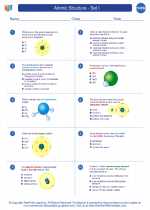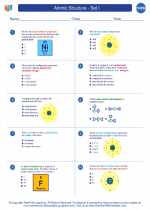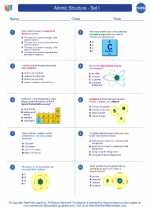Atomic Structure - Set I -> neutron
Neutron
A neutron is a subatomic particle found within the nucleus of an atom. It has a mass similar to that of a proton, but it has no electrical charge, making it electrically neutral. The discovery of the neutron by James Chadwick in 1932 was a significant advancement in the field of nuclear physics.
Properties of Neutrons:
- Mass: The mass of a neutron is approximately 1.675 x 10^-27 kilograms, which is slightly greater than the mass of a proton.
- Charge: Neutrons have no electrical charge, and are therefore electrically neutral.
- Stability: Neutrons are relatively stable within the nucleus of an atom, but they can become unstable when outside the nucleus, leading to processes such as beta decay.
Role of Neutrons in Atoms:
Neutrons play a crucial role in determining the stability and properties of an atom. They contribute to the mass of the atom and also influence the nuclear binding energy. Isotopes of an element differ in the number of neutrons they possess, which affects their stability and radioactive behavior.
Applications of Neutrons:
Neutrons have various applications in different fields, including:
- Nuclear Reactors: Neutrons are utilized in nuclear reactors to initiate and sustain nuclear fission reactions.
- Neutron Imaging: Neutrons can be used for imaging techniques, providing valuable insights into the internal structures of materials without damaging them.
- Neutron Activation Analysis: This technique involves the use of neutrons to analyze the composition of materials, particularly in fields such as archaeology, environmental science, and forensic science.
Study Guide:
When studying neutrons, it is important to focus on the following key areas:
- Understanding the properties of a neutron, including its mass, charge, and stability.
- Exploring the role of neutrons in determining the stability and properties of different isotopes of an element.
- Learning about the applications of neutrons in various scientific and industrial fields.
- Practicing problem-solving related to nuclear reactions and the behavior of neutrons in the nucleus of an atom.
By mastering these concepts, students can develop a comprehensive understanding of the role and significance of neutrons in the world of chemistry and physics.
.◂Chemistry Worksheets and Study Guides High School. Atomic Structure - Set I

 Worksheet/Answer key
Worksheet/Answer key
 Worksheet/Answer key
Worksheet/Answer key
